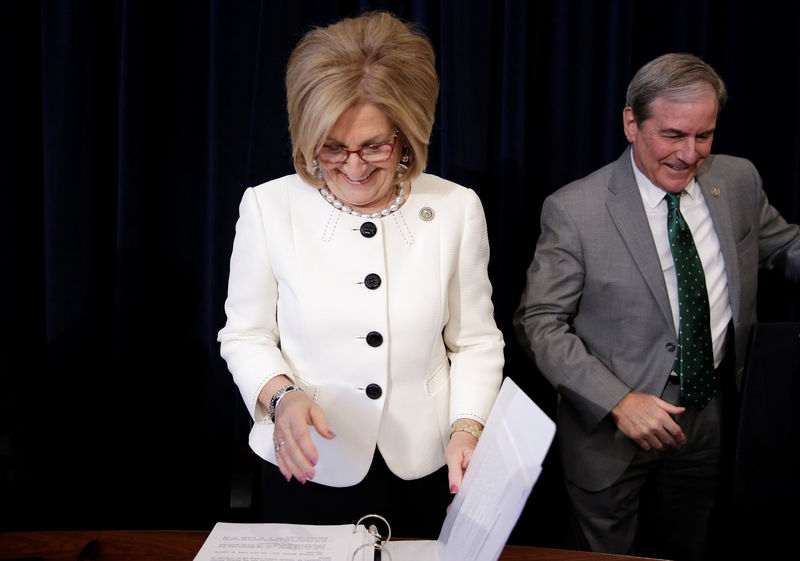By Susan Cornwell
WASHINGTON (Reuters) - Deeply divided Republicans squeezed their U.S. healthcare overhaul, backed by President Donald Trump, through a key House of Representatives panel on Thursday despite defections by three conservatives who consider it too similar to the Obamacare law it is intended to replace.
Trump's first major legislative initiative still faces an uphill battle in the full House and later the Senate despite ongoing efforts by the White House and Republican leaders to satisfy conservative opponents.
The Budget Committee vote was 19 to 17, with Republican Representatives David Brat, Gary Palmer and Mark Sanford - all members of the conservative House Freedom Caucus - joining the panel's Democrats in voting against it. The committee brought provisions approved last week by two other panels into a single bill, helping pave the way for a later vote on the House floor.
Republicans, who control Congress and the White House, could not afford to lose more than three from their ranks on the committee for it to pass.
"I don't think we are anywhere near passage," Brat said after the vote, noting that Republican conservatives as well as moderates had problems with the bill.
The 2010 Affordable Care Act, the signature legislative achievement of former President Barack Obama, enabled about 20 million previously uninsured Americans to obtain medical coverage. About half of those were through the law's expansion of eligibility and increased funding for the Medicaid government health insurance program for the poor.
The close vote illustrated the problems Republican leaders may encounter in corralling enough votes in their party to win passage on the House floor amid unified Democratic opposition. The measure now goes to the Rules Committee before reaching the House floor.
The Congressional Budget Office, a nonpartisan congressional agency, forecast on Monday that the legislation would increase the number of Americans without health insurance by 24 million by 2026, while cutting $337 billion from federal budget deficits over the same period. The bill faces opposition from leading healthcare providers, including doctors and hospitals.
"We are on track and on schedule," House Speaker Paul Ryan, who unveiled the legislation last week and is its chief champion in the House, said after the committee's vote. He added that while the main parts of the bill "are going to stay exactly as they are," Republicans were making unspecified "improvements and refinements."
Ryan told a news conference that Trump was "deeply involved" and "helping bridge gaps" among Republican lawmakers to get a consensus plan.
'CONSTITUENCY OF ONE'
Conservatives were unmoved. "There's no natural constituency for this bill," said Republican Representative Raul Labrador, another Freedom Caucus member.
"The Left is really mad about it. The Right is really mad about it. The middle is really mad about it. And so far it just seems to be a constituency of one, which is Washington insiders, people that are just trying to get something passed so they can get to the next issue."
Trump administration officials and House Republican leaders have said they hope to get the bill to the House floor by the end of the month so it can go to the Senate before lawmakers' mid-April recess.
Conservatives want a quicker end to the Obamacare Medicaid expansion, which the bill has set for 2020, and want to add work requirements for some Medicaid recipients. They also call the age-based tax credits to help people buy insurance on the open market an unwise new entitlement.
The White House said it was discussing changes with House Republican leaders. Trump told a Fox News interviewer on Wednesday that much of the bill would still be negotiated, especially as it moves from the House to the Senate.
Conservative advocacy groups praised the Republicans who voted "no." Club for Growth President David McIntosh said it makes no sense for Ryan and Budget Committee chair Diane Black to force Republicans "to walk the plank and vote for a bad bill that they've already admitted needs to be changed."
Black asked fellow Republicans who had doubts not to "cut off the discussion" by voting no.
After approving the legislation, the panel adopted four non-binding Republican recommendations for changes before it moves to the House floor, including one by the conservative Palmer on adding work requirements for able-bodied, childless Medicaid recipients.
The other recommendations called for no longer encouraging people to sign up for insurance through Medicaid, giving states more flexibility in designing Medicaid programs, and changing the bill's tax credits to help lower-income people more.
Democrats have called the Republicans' plan a blow to the elderly and the poor while giving tax cuts to the rich.

Representative John Yarmuth, the committee's top Democrat, said the legislation was "not a healthcare bill; it is an ideological document." He said the bill imagined a "fantasy land where young people don't get sick, and apparently they don't grow old either, because they don't have to worry about being priced out of the market."